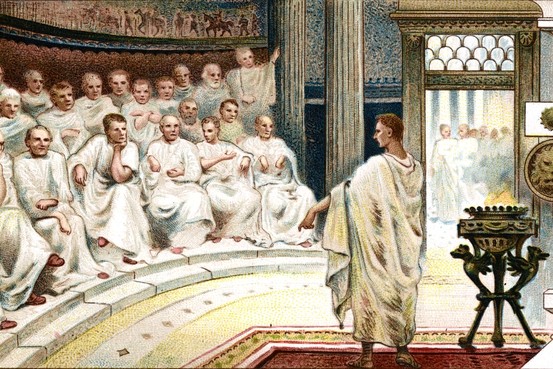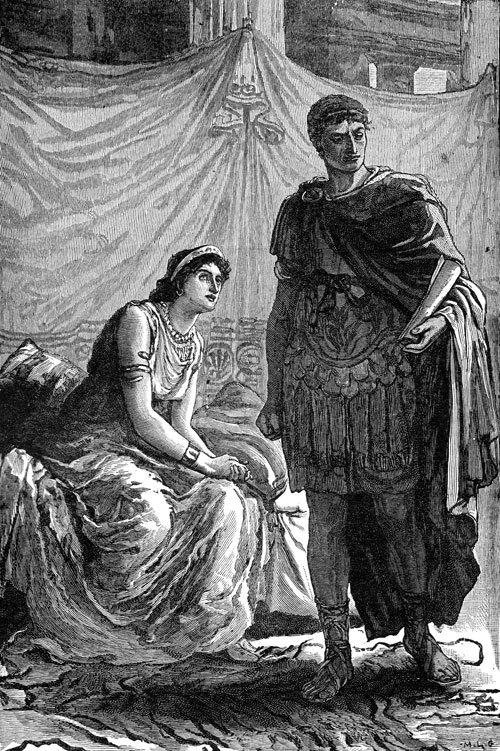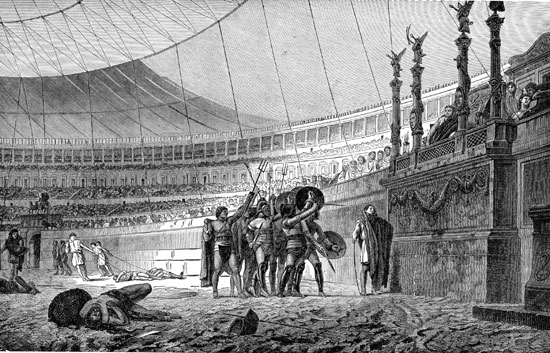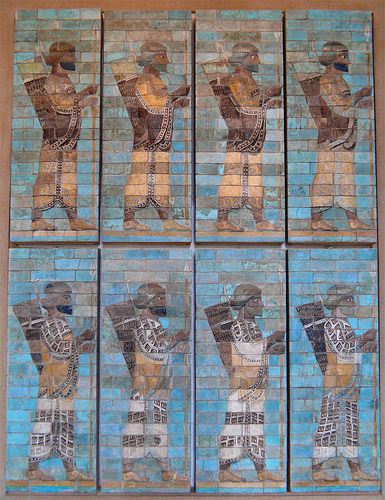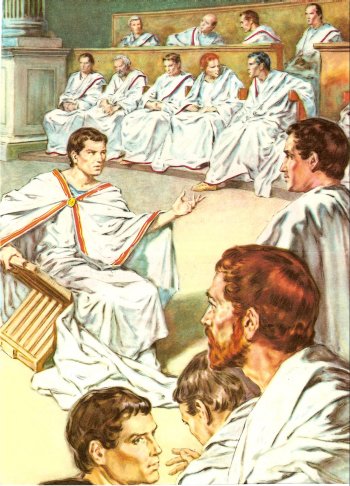The consul
Caesarion's return to Rome was destined to be brief. His fellow consul
Marcus Valerius Mesalla Corvinus did everything he could to make Caesarion's position in the Senate unbearable; among other things playing consistently on Caesarion's political and military inexperience, barbarian birth and foreign ways. He also made known his suspicions of Caesarion's royal ambitions - how could one born King now accept life as a mere magistrate? Caesarion considered resigning his public offices, but was dissuaded from doing so by his wife
Pomponia. Shortly thereafter, when reinforcements were levied for the war effort in Spain, he gladly took up the command offered him. He departed but a few weeks after his arrival, but not without first having made ample provisions for the extravagant expansion of the Temple of Isis and Serapis in the Reggio III, where he set up a shrine to his mother
Nea-Isis, the "new Isis", and father
Divus Iulius, the "divine Julius", presented now as an incarnation of Serapis.
Pomponia had miscarried before, but on Caesarion's departure was pregnant once more. She accompanied him as far north as Mediolanum, where he empowered her to carry out and supervise the acquisition of sufficient land and materials for the construction of a suitable temple of Isis. It was at Mediolanum that she gave birth to a son, to whom Caesarion defiantly gave the Greek name
Isidoros, "
gift of Isis", properly
Isidorus Julius Caesar in Rome.
In Spain, Caesarion, even before his arrival, quarrelled over strategy and tactics with the triumvir Publicola,
Imperator Hispaniae; instead of joining Publicola at his camp, Caesarion advanced with his men straight into Asturia and engaged the surprised barbarians. Then, of his own accord, he negotiated with the Asturians, guaranteeing them their lands and parts of Cantabria, in return for their subjection to Rome and the construction of a string of Roman constructions throughout their dominion.
As expected, Publicola was infuriated and promptly sent word to Caesarion dismissing him at once. Caesarion obeyed, though not out of any sense of obligation to Publicola, but in order to hurry back to Rome and secure the Senate's approval and recognition that the conquest of Asturia had been effected solely on his account, thereby reverting to him - and not Publicola - the extensive rights granted to Publicola thereto.
As he descended towards Rome, Caesarion was informed that the Senate had upheld Publicola's claims of seniority and refused to vote a triumph for Caesarion, who had been acclaimed
Imperator by the legions in Spain. Defying the Senate, Caesarion entered the city in triumph, accompanied by many chieftains and noblemen of the defeated Asturians and Vaccaei. Instead of the Temple of Jupiter, the customary destination of triumphs, he proceeded to the Temple of Isis and Serapis, where he sacrificed to his holy father and mother and thanked them for his victory. His troops - known for being notoriously well-paid - accompanied him and stopped attempts by agents of the Senate and Messalla Corvinus to bring the pseudo-triumph to an end. From the gates of his palatial residence, Caesarion's servants served wine and bread to the populace.
Publicola remained in Spain some while longer, ironicly putting in place Caesarion's plans and agreements with the natives. When he arrived in Rome two months later, the populace could barely conceal their disdain at the triumph voted him by the Senate for a victory that wasn't even his.
Though Caesarion had left the Senate incensed, there were bigger issues at hand. (Beyond which the Senate did not dare upset the legions or mob by taking any effective action against Caesar). News of Vipsanian's slow progress and military defeats in Armenia had made their way back to Rome, to the great worry of the Senate. What of the glory of Rome if the Republic's best legions could not defeat the petty Medes or Parthians, even when the latter were shoulder-high in civil war? Surely yet
another defeat would imperill Rome's Asian possessions, leaving them entirely open to conquest from the east as soon as the barbarians resolved their internal disputes. Victory was the only option.
In accordance with a famous prophecy of the Sibylline Oracles (universally held in the highest regard by all), the Parthians would only be defeated by a King. It was this same prophecy that had been formed the basis for suggestions that Caesar abolish the Republic and restore the monarchy, sometime before his death. Now the Senate turned to his son Caesarion, sometime Pharaoh and King, as the only general whose command would not injure the principles of the Republic and simultaneously fulfill the prophecy, to command a new expedition east. No sooner had the suggestion been raised than Messalla Corvinus brought new accusations of sordid royal aspirations and decidedly unrepublican feelings in young Caesarion. The project was thus prevented from materializing; to his great credit with the Senate, Caesarion not only refused the command but also offered to resign office both as Consul and Pontifex Maximus. For fear of angering Vipsanian (who had personally preferred him to these offices), and no doubt also the legions and the Roman people, the Senate unanimously begged him not to do so. To his further credit, Caesarion then advanced a proposal which met with universal approval - even that of Corvinus; namely, that Vipsanian be invested with the priesthood known as
rex sacrorum. The
Rex Sacrorum, "King of Holy Things", was a special priesthood with nominal seniority over all others (though in reality it had long been surpassed in importance by the Pontifex Maximus). The Rex and his wife, known as
Regina Sacrorum, carried out the sacral duties of the old Kings and queens of Rome, whilst maintaining the Republic intact by foregoing any military or magisteral office. As
Pontifex Maximus, Caesarion had the prerogative of naming the
Rex Sacrorum, which he promptly bestowed upon Vipsanian following the Senate's decision to left the ban on the combination of this priesthood with secular office. In this way, Vipsanian might receive it and thusly fulfill the prophecy and restore Rome's honour.
Caesarion, as both the man behind this most nifty of solutions as well as Vipsanian's closest male kinsman and Pontifex Maximus in his own right, was chosen to represent Vipsanian at his inauguration, where he was anointed and sacrificed, head covered, alongside the Empress Clodia, now also
Regina Sacrorum. Clodia wore a headdress called the
arculum, formed from a garland of pomegranate twigs tied up with a white woolen thread, whilst Caesarion wielded the ceremonial axe and donned the undecorated soft "shoeboot" (
calceus).
As the ceremonial axe, shoeboot and other aspects of the priest hood were hastily dispatched east to Vipsanian, Caesarion received a new command from the Senate. As something of a compensation for the "loss" of Asturia, he was sent north into the Alps, to march against the Seduni, Salassi, Veragri and other nearby tribes who controlled much of the Alpine passes. (The command being a reward given the potentially huge profits of a successful campaign).
Caesarion and his troops were at
Bononia when he received word of Vipsanian's capture. He made as if to return to Rome, but was warned of a plot against his life by
Livia Drusilla, on whose advice he stole away to
Ariminum, a port on the Adriatic, to await word from Rome. The following day he received another courier from her, bearing the dreaded news. On account of Vipsanian's capture, the Senate had issue a decree, determining the end of the triumvirate and overturning the
Lex Antonia. Messalla Corvinus, as the only present consul, had (as expected) foregone the dictatorship, nominating instead Publicola (as was the Consul's prerogative in such cases). Publicola ignored recommendations that Caesarion should be his Master of the Horse,
Magister Equitum [1], ostensibly on grounds of the latter's great youth, elevating instead his colleague Crassus (who was already hurrying back from Gaul).
Fearing for his life, Caesarion sent his troops over-land into Dalmatia and Greece, himself stealing away by boat from Ariminum. His wife and children, as well as close associates such as Scaeva and Gepaepyris, were ordered to make haste either to Athens or Abdera (the royal court of Gepaepyris' father, King Cotys). The Empress Clodia also deftly removed herself from Rome as well, lodging herself at Octavia's villa in Athens.


